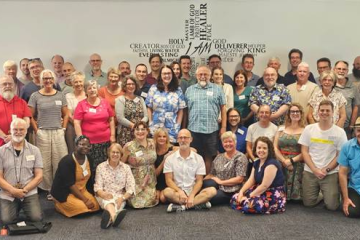(no audio available this week)
Psalm 97, Acts 16:16-34
Sometimes stories grow a little in the telling. For instance, if Aron was to tell you about the first time I drove the hire car in Scotland – a manual and I usually drive an automatic – the skidding and the stalling and the bunny hopping would no doubt be grossly exaggerated. Or if either of my daughters were to tell you about how I kept chatting on a mobile phone after a three-year-old Grace had fallen into a rock pool and how she was eventually, heroically rescued by her six-year-old sister, that story bears very little resemblance to reality. But these are the stories we keep telling. They entertain us. They celebrate our survival skills (even from each other!) and they create bonds to strengthen us for the road ahead.
And in the same way, today’s reading, which follows on from last week’s reading from Acts, continuing the story of the first Christians in Philippi, is full of vivid detail and drama and symbolism “in a manner”, says commentator William Loader, “which stretches the fabric of the narrative at time beyond the credible.” Earthquakes are not uncommon in this region – the Alpide earthquake belt extends right through the Mediterranean – and modern-day Turkey has experienced many devastating earthquakes. But this is very unusual earthquake. Rather than trapping and crushing people, it opens doors and unfastens chains. This earthquake is a physical manifestation of the freedom Paul gives to the slave girl, or the freedom in Christ that Paul and Silas know even in prison; a physical manifestation of how God is shaking the powers of this world to their foundations.
It was undoubtedly a story that the Philippian church told and retold about their foundations.
But there are three more ordinary features of the church noted here; features that were formative for the Philippian church and the early church in general; features that continue to be formative for the church – even today.
The first is found in this odd account of Paul freeing the slave girl with the spirit of divination. The commentaries are full of questions about this story. Why didn’t Paul just heal this girl the first day he met her? Was she saying something offensive or was her shouting just annoying? Does Paul in the end heal her just because he became, as the text says, ‘very much annoyed’?
My theory is that this story illustrates that the church here is wrestling, just as it always does, with how to live out the gospel in this context. Are Christians simply to be good citizens – good Roman citizens in this case – because this is the charge laid against Paul and Silas; that they are disturbing the city and advocating customs that disturb the Roman way of life! Or must Christians challenge economic models that exploit the vulnerable – that have a spiritual dimension as illustrated by this slave girl – and the political and social systems that reinforce this exploitation? You will remember the Dom Helder Camara quote, “When I give food to the poor, they call me a saint. When I ask why the poor have no food, they call me a communist.”
I think this tension is illustrated in this passage and in the actual tension in Paul. Whether you live in the first century or in the first world, responding to a world of inequality is challenging; how do we decide what issues to address and what our response should be? Yet Paul and Silas do act. They dispatch the evil spirit and dispatch the income stream (the writer of Acts makes a pun by using the same verb here). They decide to confront this exploitative economic model, perhaps because they have, as we read on in the text, a space and a place where the questions of how to live out the good news can be wrestled with and responded to.
Secondly this story reveals another formative feature of the church in Philippi and other expressions of Christian faith throughout history. After Paul and Silas have been attacked by a mob, stripped and beaten and thrown into jail, what do they do? They sing! Not ‘Nobody knows the trouble I’ve seen’ – not laments for their suffering which as the commentaries say would have been, “understandable, appropriate and biblical” – but hymns of praise!
Now I have limited experience in jail cells (I may need to challenge our economic and political systems more robustly) but the little I do have fits with this story. In the holding cells of the Canberra courthouse a few decades ago I and others belted out a few songs – ABBA numbers I must confess – but also – with those who knew them – Taizé chants; The Lord is my light, my light and salvation, or In the Lord I’ll be every joyful, in the Lord, I will rejoice. Look to God, do not be afraid. Lift up your voices, the Lord is near. Lift up your voices, the Lord is near. Singing these songs – singing these prayers – making our prayers embodied prayers – brought God closer to what we were going through.
Perhaps this was how it was for Paul and Silas. They sang hymns of praise because they knew God was close to them. And singing songs of praise brought God closer. Perhaps they sang the psalm we read this morning:
The Lord loves those who hate evil; he guards the lives of his faithful; he rescues them from the hand of the wicked.
Light dawns for the righteous, and joy for the upright in heart.
Rejoice in the Lord, O you righteous, and give thanks to his holy name!
On today’s bulletin is this picture of the night stair from Hexham Abbey. This is the name for the staircase that monks used to move directly from the dormitories to the sanctuary at night. Hexham wasn’t on our recent travel itinerary, but we did see where the night stair had been in Melrose Abbey. According to our audio guide, the monks rose to sing and pray at night in obedience to Psalm 119:62 “At midnight I rise to praise you…” Listening to that, I thought this was an over literal reading of scripture and yet, here again in Acts, at midnight, in their emotionally darkest hour, Paul and Silas also pray and sing hymns to God.
I wonder if this is something, we, the current church, need to embrace more, need to allow to form us in faith, that in our troubles and trials we should respond by singing praise! Singing of a God whose salvation is near. And bringing our saving God nearer to us in our singing.
The third formative feature of the Philippian church detailed in this passage is the location of the church fellowship in people’s homes. In verses 32-34:
[Paul and Silas ] spoke the word of the Lord to him and to all who were in his house. At the same hour of the night he took them and washed their wounds; then he and his entire family were baptized without delay. He brought them up into the house and set food before them; and he and his entire household rejoiced that he had become a believer in God.
Here, in the home of the Philippian jailor, we see the word of God being spoken, service to others being demonstrated, baptism and a shared meal. William Loader writes, for the early Christian movement, the home became “a place for welcoming others, for sharing meals, including the eucharist, and for telling the stories and legends of faith. When such households converted and were baptised, children and slaves included, salvation meant a change of household which for some would be quite revolutionary and for authorities, concerned to maintain an ordered society with slaves at the bottom, a big worry.”
This was the place, the church in the home, where people could wrestle together with how to live out the life-giving and culture-changing news of the gospel in their world. This was the place where people could encourage each other to rejoice in suffering, discovering, as so many New Testament verses say, that suffering produced character and brought them closer to Christ; and Christ closer to them.
By and large churches no longer meet in homes. Mostly we gather in larger groups in larger spaces, as we do here, with more formalised patterns of worship. Here we hear the word of God, are encouraged to do service to others, are baptised and celebrate one shared meal as we did this morning. There are wonderful things about this worship, and we are not limited to this – we have small groups, one on one conversations and even meetings and committees – but perhaps we need to ensure that these places and spaces enable us to wrestle together with what following Jesus today means for us, to praise God together in good and bad, to engage in hospitality and service to others, to share our lives.
I was casting about for images of household fellowships and came across a church in the US that is cancelling their regular Wednesday programmes this summer (now) to encourage people to have eight different meals. The challenge is to do all eight; a Blessing Meal with someone who has had a recent difficulty, a meal with a neighbour, a church meal, a meal with someone from a different generation, a meal to connect with a new person, a family meal (with all screens turned off they note), a meal with friends and a Gratitude Meal with someone who has made a positive difference in your life. There are good ideas here. Perhaps we could add a meal for confronting injustice and a meal for singing God’s praises.
I said at the beginning that sometimes stories grow in the telling. But in the sharing of food, the sharing of struggles, the sharing of songs, the sharing of faith stories, people also grow. Households of faith also grow. Churches of households of faith grow.


